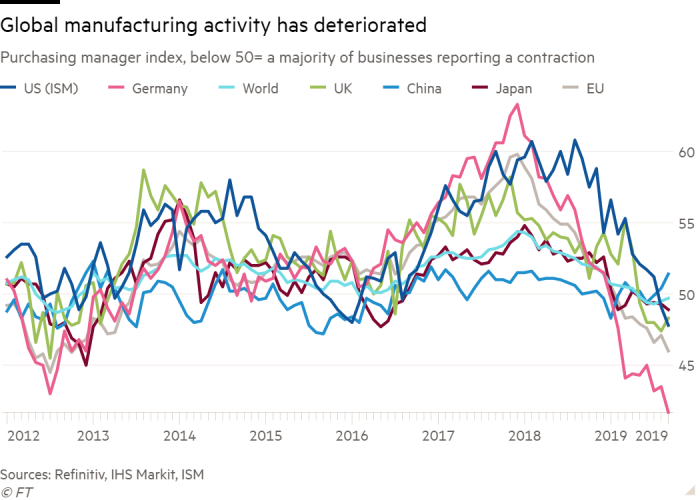Source: Financial Times, October 1 2019
By Valentina Romei in London
Global manufacturing activity further deteriorated in September as exports orders fell amid an escalation in the US-China trade war.
The JPMorgan Global Manufacturing PMI rose marginally to 49.7 in September from 49.5 in August, marking the fifth consecutive month below the 50 mark which, indicates a majority of businesses reporting falling output. The last time the index was in contraction for such a stretch of time was in the six months to November 2012.
The fall was stronger in intermediate and investment goods, which are more affected by the trade war as uncertainty weighs on business’ spending plans, even in countries not directly affected by the tariff war.
Global new export orders were a drag on the sector, with the sub-index tracking these coming in at 47.98.
“The sustained softness in the sector increases the risk of further negative spillovers to the consumer and service sectors of the economy” said Ben May, economist at Oxford Economics.
The data were released as the World Trade Organization sharply downgraded its forecast for trade growth in 2019 and 2020. World merchandise trade volumes are now expected to rise by only 1.2 per cent in 2019, substantially slower than the 2.6 per cent growth projected in April.
“Beyond their direct effects, trade conflicts heighten uncertainty, which is leading some businesses to delay the productivity-enhancing investments that are essential to raising living standards,” said WTO Director-General Roberto Azevêdo
The Global IHS PMI paints a more optimistic picture than national surveys as it does not incorporate the ISM manufacturing index, which dropped to a 10-year low in September, driven by a plunge in new exports orders amid the worsening of the US-China trade war.
Instead, the global PMI uses the IHS PMI index for manufacturing that showed an improvement largely reflected in the global index.
“The PMI is consistent with our rest-of-the-year outlook in which we expect modest growth in global manufacturing output. Conditions will need to revive if manufacturing is to show a substantial recovery in the coming months” commented Olya Borichevska, from Global Economic Research at JPMorgan.
The Eurozone IHS Markit manufacturing PMI — released earlier on Tuesday — dropped in September to its lowest level since October 2012. In contrast, The UK manufacturing activity improved — while remaining in contraction — largely because of stockpiling activity ahead of the Brexit deadline on October 31.

